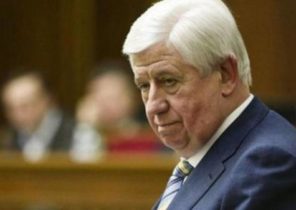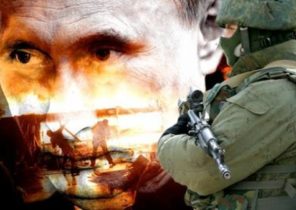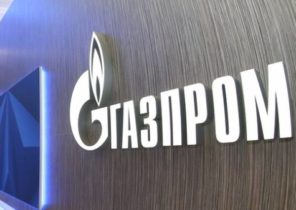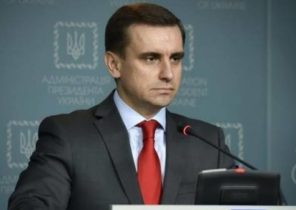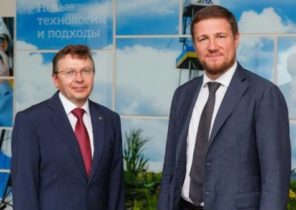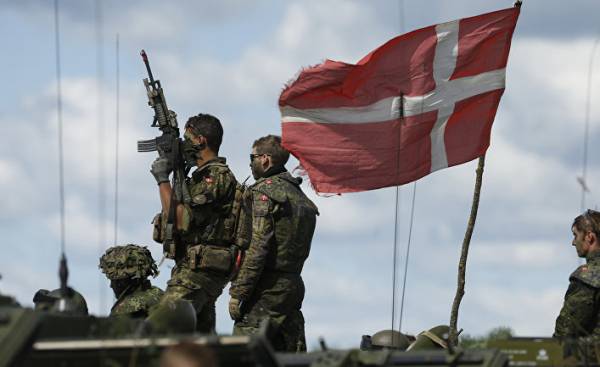
“Get down! Get down! Get down!”
Hoarse voice. One cheek Kristiania Vizbaras (Kristijanis Vizbaras) shrank in the wet gravel. Over the low hills of shots rang out.
A routine patrol ended in a nightmare. The division was ambushed. The spotlight’s been poking around, and frozen fingers can not cope with the machine. It’s too late. One of the soldiers already writhing in the mud, badly wounded.
They are in the minority.
“Back!” — screams Cristianis.
He grabs the strap of her bulletproof vest of the wounded and drags him on the wet gravel.
It’s hard. A few minutes ago, they stood and chatted about their plans for the weekend. Scratched beard, chewing gum and complained about the bad weather. That’s the point, says Thomas, broad-shouldered soldier of the militia with the aspiring gray beard.
“The Russians could come back tomorrow. They can come in a month. They can come in a year. And so we must be ready,” he says, on the shoulder dangles a automatic rifle AR15.
In civilian life this nearly six — foot Lithuanian is the father of three children and an economist at the firm, which is engaged in the sale of timber. But a couple of times a week he wears camo and shoots targets, and is held tactical exercises on the ground in 20 km from the capital Vilnius. Because he is afraid, he says to this fellow. The peaceful everyday life is not considered something self-evident when you live in a small country bordering Russia.
“We thought that we should get into NATO, we will be safe. But you saw what happened in 2014,” says Thomas.
The crowd nods. There are two engineer, one banker, one doctor, several individual entrepreneurs — all over 30.
This “middle class” from Vilnius, who took up arms.
Russia’s annexation of the Ukrainian Crimean Peninsula three years ago may seem like some distant event, if you are in Western Europe. But in Lithuania and two other Baltic countries, the wave of shock after the lightning operation Russian and not passed. For many, the ongoing conflict in Eastern Ukraine, which claimed over 10 thousand lives — a living reminder that we must be prepared for the worst.
“The Ukrainians didn’t know they were coming. And they came,” says Cristiani, Vizbaras.
He is the Deputy commander of militia groups. The events in Ukraine was a direct reason that he joined the group “Arrows” — so calls himself the group of the militia. Physicist, specializing in semiconductors, which for 32 years, were shocked when Russia “invaded a neighboring country, and got away with it”.
“My first thought was: this is happening really. My next thought was: who’s next?” says Cristianis, Vizbaras.
So in Lithuania think a lot of people. A Baltic state with three million inhabitants, has a 227-kilometer border with the Russian Kaliningrad oblast. In her big neighbor posted last year in a brand-new Iskander missiles, which can carry nuclear warheads. Shortly after the Russian operation in Ukraine, a series of military exercises in Western Russia that took place without notice, forced many in the Baltic countries covered in a cold sweat.
One could hardly imagine a better recruiting campaign for the Lithuanian militia. For the third year in a row “Arrows” I don’t know of people wanting to join them. In 2013 they had 100 active members, but now only in the district of Vilnius, their $ 1.5 million, says Cristianis, Vizbaras.
And for government events in Ukraine are a Wake-up call. Lithuania abolished conscription in 2008. At the same time was drastically reduced defense spending. After 2014, everything changed. A year after Russia’s annexation of the Crimean Peninsula conscription was reinstated in the defense budget again began to receive money. Next year it is expected that the defense will spend more than 2% of GDP.
At the highest level in NATO the Ukraine crisis has also led to the historic breakthrough. In the fall of 200 Danish soldiers will be sent to Estonia, where he will be included in the so-called forward-based forces of the Alliance. Just each of the three countries will be a thousand NATO soldiers.
The basic idea here is that relatively small units — the first coordinated ground forces in the Baltic States since, as the country was accepted into the Alliance since 2004 — have become a kind of military stretch. This contingent needs to make clear that aggression against the Baltic States is tantamount to aggression against the multinational forces from Nordic countries, UK, Netherlands, Germany, France and the United States.
“This small contingent. But he confronts the Russian leadership following question: is it worth it to test the unity of NATO?” — says the Minister of defence of Lithuania raymondas Karoblis (Raimondas Karoblis).
2014 also meant something else and more sinister. For the first time since the cold war generals and politicians on both sides of the border are talking about the risk of “hot conflict” between Russia and NATO.
It’s unlikely, but not unthinkable — this is the wording of the Lithuanian Minister of defense. But when Russia sent troops across the border with Ukraine, it also meant that none of Russia’s neighboring countries can no longer afford to ignore such gloomy scenario.
“Thus, Russia has shown that the borders and territorial integrity of the countries of Europe most guaranteed to be. This is especially true of countries bordering Russia”, says Raimundas Karoblis in an interview with Berlingske.
And so Lithuania could not rule out “full-scale conflict with the use of conventional weapons or a limited conflict with conventional weapons” a great neighbor, he says.
This statement shows the strategic perspective. An attack on a member of NATO should — in contrast to the operations in Ukraine indicate that the Kremlin is prepared to take risks and unleash a third world war against the enemy of the NATO Alliance, which is still superior to Russia militarily on all counts.
There is also a more specific fear that is felt when the Minister becomes more explicit. It is the fear of the shadow operations that can begin as disturbances and cyber-attacks, and to end armed men who will take control of a police Department, a municipality or a border town until someone in NATO will have time to think, do such actions that the time has come to act in accordance with article fifth musketeer oath of Alliance.
“From the point of view of defence, Moscow views the Baltic States as the weakest link. And if you decide to test NATO, then this is the right place to strike,” gloomily said Karoblis.
In the Lithuanian border town šalčininkai event in early April has developed just such a scenario.
Suddenly the streets were armed men. They came out of the woods. They crowd walked from the station in a small town and in no way tried to hide. Blocked roads and shouting something, walked through the streets, waving their “Kalashnikova”. Within hours they had captured the border post and police station, the police took numerous hostages, and two were beaten to death.
So it would be, if it was in reality. Because really it was an exercise. But if you ask the Lithuanian authorities, the result in itself was quite frightening.
The aim of the exercise was to test the reaction of the local police, the local barracks and residents. Everything went as it should have. The radio did not work, the police gave up too quickly, and very few civilians know how to raise the alarm.
“The enemy forces of this type move quickly and quietly. Therefore, it is important to immediately raise the alarm and to react cautiously,” — said the Minister of internal Affairs Eimutis Misunas (Eimutis Misiunas) in an interview with the online edition Delfi.lt.
In Russia, the debacle also did not go unnoticed. There it is presented as another manifestation of the aggressive anti-Russian hysteria in the Baltic countries.
“Lithuania continues to expose yourself to ridicule in front of their neighbors,” wrote Pro-government Russian newspaper “arguments of the week”.
In the Russian state media — which go to the Lithuanian — concern of Lithuania is rejected as absurd. The aggressive side is NATO, but the new forces in the Baltic States are a threat to Russia and attempt to take the country into the ring with military bases, it’s called.
“Only mentally ill and only in my sleep can imagine that Russia suddenly would attack NATO. I think that some countries simply use people’s fear in front of Russia”, — said the President of Russia Vladimir Putin in 2015, shortly after NATO took its decision.
Lithuania, which is in contrast to Estonia and Latvia has a large Russian minority, became the target of criticism by Russian media and politicians.
“All similar to Ukraine together with NATO Lithuanians are preparing a war against Russia,” — said in a January story on the largest Russian state news channel “Vesti”.
But the biggest concern in Lithuania has caused another part of the verbal war. Prominent Russian policy after the start of the Ukrainian crisis began to question the borders of the Baltic States and the right of these countries to independence.
Nationalist politician Vladimir Zhirinovsky, the leader of the party and Vice-speaker of the Russian Parliament, appeared on national TV for “the return of Vilnius and Klaipeda”, two Lithuanian cities. Two members of Parliament from the ruling party of Vladimir Putin two years ago urged the Supreme Court to declare the Declaration of the Baltic countries on independence from the Soviet Union of 1991 invalid.
Such statements are not official policy. But many Lithuanians slogans on the law of Moscow for supremacy in the region are painful memories.
14 people were killed, 700 were injured when Soviet troops in 1991 entered Vilnius. Such was the reaction to the Declaration of independence of the country. Today the former headquarters of the KGB in the city turned into a Museum of the victims of the crimes of the Soviet period. Victims of Josef Stalin’s purges were more than 300 thousand Lithuanians, the cleaning has left scars in the same number of families.
The Museum in Vilnius there are also exhibition dedicated to the so-called “forest brothers”, the Lithuanian partisans, who were doomed to lose the fight against the Soviet annexation — in 1950-ies. Many in the militia, belonging to the armed forces of the country, I consider them today’s heroes and role models.
“Families talk about it”, — says the militia Thomas.
“My father was born in Siberia, because my grandfather was deported. He had to mine coal in Vorkuta. And his brother died. For which they punished? This is the story of our family. We’ve all seen it before. We remember the Soviet Union. I will fight for something that never was,” he says.
Cristianis, Vizbaras says excitedly:
“Maybe you are there in Denmark or Germany sit back and think that Russia is no threat. We can’t afford to think so. You have to understand that we have a neighbor who does not respect borders,” he says.
But such thinking is not widely understood. In recent years, the Lithuanian diplomats had to face the fact that the Russian charges, which we are talking about small warlike neighbours, heard in other NATO countries.
And the front national in France, and Donald trump in the US during their election campaigns have raised doubts about the obligations of NATO to defend the Eastern members of the Alliance. Newt Gingrich, a veteran Republican party, called NATO member Estonia “suburbs of Saint-Petersburg”.
“I’m not sure that would risk nuclear war over a place, which is a suburb of St. Petersburg”, — he said to CBS.
Renatas Norkus (Renatas Norkus), who heads the Department of security policy Ministry of foreign Affairs of Lithuania, vigilantly behind these trends. Former Lithuanian Ambassador in Moscow Russian knows the arguments better than many others. Now they are presented in German, in French and in English through the state channel Russia Today and via Sputnik.
“No reasonable person can say that NATO threatens Russia in the Baltic States. NATO will be 1.2 thousand troops when the contingent will arrive in the summer. Russia has in its Western military district, about 300 thousand people”, — is the answer Renatas Norkus at the accusation.
It indicates the capacity of Russia’s weapons: missiles, warships and coastal defense in Kaliningrad, which, according to him, as if specially created in order to block the delivery of military equipment in the Baltic countries in case of war.
But he agrees that deep distrust is a serious problem.
“In General there is a lack of trust. This must have something to do. Who will make the first step? We believe that Russia must change its behavior and rhetoric,” — says Renatas Norkus.
NATO is also concerned about the tensions on the other side of the border with Russia. Before the annexation of Crimea, the contact was much closer. The two sides met in the Council Russia-NATO, Danish and Russian Navy participated in the General doctrines of salvation in the Baltic sea.
Today contacts are rare, trust they don’t stand out, says Jacob Segard Larsen (Søgård Jakob Larsen), Danish Colonel and head of NATO division in Vilnius.
“In order something goes wrong, you have not so many misunderstandings. Therefore, the trust must be returned,” he says.
“All the plans that I work with, are about how to avoid conflict. How do we get the right signals to avoid the escalation?” — he asks.
The climate is often reminiscent of the breath of the coldest periods of the cold war. But still the situation is very different from the then, in particular because the European and the Russian economy today is closely related to each other.
“Representatives of Russia see me as a provocateur. It is necessary as-that to change,” says Jakob Larsen Segard.
“Arrows” breath. Someone, panting, lying on the gravel at the back. The other is lying, propped on my elbow. Wounded, Linus, made a miraculous recovery and became willing to lunch a military doctor, who was standing, slowly chewing a sausage.
The drill over, but Cristianis, Vizbaras continues to summarize transactions, where the superiority was too great.
“We should not be easy prey. We have to be hard prey,” he argued, drawing escape routes with the toe of his boot on the gravel.
Listening with half an ear. All have already started packing things to return to normal life.
The arms race in the Baltic sea
After the start of the crisis in Ukraine and Russia, NATO has begun to build strength in the Baltic.
In 2014, Russia annexed the Ukrainian Crimean Peninsula and Pro-Russian separatists have taken control of territory in the East of Ukraine.
At the summit in Warsaw in 2016, NATO has adopted a decision to deploy four battalions in Estonia, Latvia, Lithuania and Poland, which corresponds to a thousand soldiers in each country. 200 Danish soldiers in the fall are contingent in Estonia.
Russia in the Western military district with 300 thousand soldiers. In its enclave of Kaliningrad Russia has placed in 2016 Iskander missiles ready to carry nuclear warheads. According to Russia, it was a response to the creation of the American missile shield in Europe.
The military budget of Russia in 2013-2016 year increased from $ 57 billion to $ 70 billion. The total military budget of the Baltic countries during the same period increased from 931 million to $ 1.5 billion. The total military budget of NATO countries in 2016 amounted to 918 billion dollars.
Sources: Sipri.org, Economist.com
